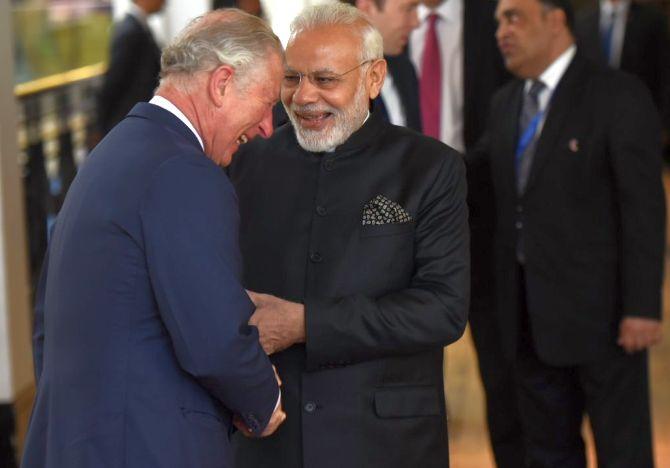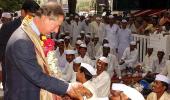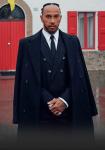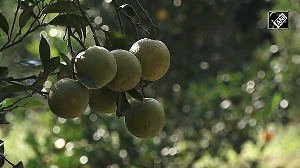The unfortunate associations with the name Charles for an English king -- one who was executed; the other with a very unsavoury reputation -- led royal observers to assume that Charles would not take his Christian name when he became king.

Unlike her father King George VI, Elizabeth Windsor retained her first name as queen when she ascended the throne on his death in February 1952.
She was called Elizabeth II to differentiate her place in history from Elizabeth I, the Tudor monarch who reigned from 1558 to 1603.
Elizabeth I was, of course, the subject of Shekhar Kapur's 1998 film Elizabeth and his 2007 sequel Elizabeth: The Golden Age, both starring the luminiscent Cate Blanchett as the virgin queen.
Queen Elizabeth II's father King George VI had become monarch after a cascade of tumultuous events in 1936.
When his father King George V -- who presided over the grand imperial durbar in Delhi in 1911 -- died on January 20, 1936, his elder brother, known as David by his family and friends, became king and took the regnal name Edward VIII.
But Edward VIII was king only for 325 days -- the shortest by a male monarch. He abdicated the British throne on December 11, 1936 because he wanted to marry a twice-divorced American, Wallis Simpson, which was then forbidden by the Church of England (the British monarch also heads the church of England).
The abdication forced Prince Albert, Edward VIII's low profile, uncertain and stammering younger brother, to become king (and the last emperor of India by the way).
Prince Albert Frederick Arthur George took the name King George VI as a sign of continuity with his father's reign, to bring a sense of calm to the realm shocked by Edward VIII's abdication.
Queen Elizabeth II became queen while on a trip to Kenya after her father died suddenly in London. Her mother, also Queen Elizabeth, blamed her brother-in-law Edward VIII -- later the duke of Windsor -- for her husband's early death (he was only 56) by being forced to become king after the abdication.
Elizabeth was in a forest lodge when she was told of her father's death. The night before she flew back to London, she was said to have been guarded in her bungalow overnight by that great hunter of tigers in the Kumaon, Jim Corbett.
The naturalist, author and famous slayer of man eating tigers in the foothills of the Himalayas, after whom the Corbett National Park in Uttarakhand is named, had moved to Kenya shortly after Independence.
Like her, her son Charles was also away from London when he became monarch of the British isles. Charles was at his mother's side in Balmoral Castle in Scotland on Thursday, September 8, 2022, as she passed into the ages.

Queen Elizabeth's first born Charles Philip Arthur George, Great Britain's new king, has chosen to be called Charles III.
Like his mother, he continues with his given name as his regnal name [name as king].
Charles III is the oldest royal to become a British monarch. He has visited India ten times, the last trip was in November 2019. He celebrated his 71st birthday in India on November 14 on that visit.

India and Mumbai has an older connection to another British monarch with the same name.
King Charles II received the island of Bombay as part of the royal dowry when he married Catherine of Braganza, daughter of the king of Portugal in 1661.
The seven islands of Bombay were given to the Portuguese in a treaty of peace and commerce by the sultan of Gujarat in 1534.
The island passed into British hands after Charles II's marriage. Charles II rented Bombay to the East India Company for an annual rent of 10 pounds in 1668.
Catherine, his queen, did not produce any heir and suffered three miscarriages. Charles II, also known as the 'merry monarch' for his wild lifestyle, had several mistresses and illegitimate children.

Since King Charles II did not have a legal heir, the crown passed to his brother James II in 1685 after his death.
Catherine died in Portugal in 1705. According to the UK Tea and Infusion Association, Catherine played a prominent role in making tea a widely drunk beverage in England ('Have a cuppa' is probably the most familiar phrase in Britain). Among the gifts that came with her from Portugal was a chest of tea.
Charles II's father King Charles I was crowned in 1625. His reign was dogged by civil wars in Scotland, Ireland, England and confrontation with parliament. He was charged with treason and beheaded in 1649.
King Charles I is the only king in British history to be executed. His severed head was sewn back into the body after the execution.
Oliver Cromwell, politician and military commander who led the army of parliament against King Charles I, became the Lord Protector of the Commonwealth of England, Scotland and Ireland after the king's execution.
Oliver Cromwell died in 1658. Two years later, in 1660, the monarchy was restored with King Charles II on the throne.

The unfortunate associations with the name Charles for an English king -- one who was executed; the other with a very unsavoury reputation -- led royal observers to assume that Charles would not take his Christian name when he became king.
The odds were on Charles being King George VII, in tribute to his grandfather King George VI.
So there was palpable surprise and astonishment when British Prime Minister Liz Truss -- all of two days in the job -- revealed on Thursday night that the new monarch would be known as King Charles III.
Hopefully, this fan of Ayurveda and yoga will have a more successful reign than his two namesakes.
Feature Presentation: Aslam Hunani/Rediff.com











 © 2025
© 2025